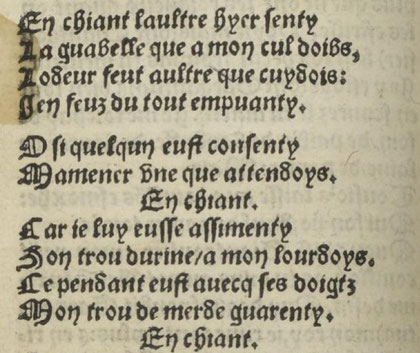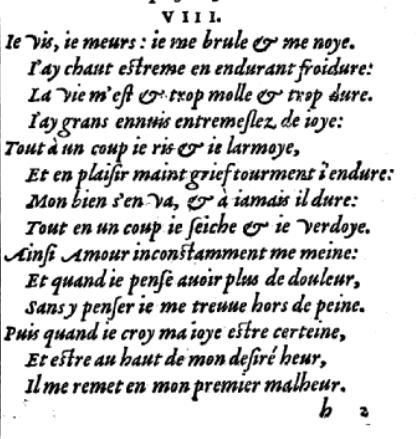The Renaissance: print and polemic
Click on the 'author' links below for more information on the material we're covering on each text
Gargantua
Further Reading on Gargantua and related topics
General
books
*Kathleen M Hall, Rabelais: Pantagruel and Gargantua, Critical Guides to French Texts 88 (London: Grant and Cutler, 1991)
*Françoise Charpentier, Gargantua de François Rabelais (Paris : Pédagogie moderne, 1980)
*Dorothy Gabe Coleman, Rabelais: a Critical Study in Prose Fiction (Cambridge: CUP, 1971)
*M A Screech, Rabelais (London: Duckworth, 1979)
Michael Heath, Rabelais (Arizona: Medieval and Renaissance Texts and Studies, 1996). Available electronically here: https://archive.org/details/rabelais00heatuoft
* good, accessible ways into the text.
John O’Brien (ed). The Cambridge Companion to Rabelais (Cambridge: Cambridge University Press, 2011). Can be accessed electronically via the library website.
Max Gauna, The Rabelaisian Mythologies (London : Associated University Presses, 1996)
John Parkin, Interpretations of Rabelais (London: E Mellon Press, 2002)
M Bakhtin, Rabelais and His World (Bloomington, 1984; 1st published in 1967)
Kinney, Arthur F. Continental Humanistic Poetics: Studies in Erasmus, Castiglione, Marguerite de Navarre, Rabelais and Cervantes. (Amherst, Mass.: University of Massachusetts Press, 1989)
Rabelais, Writing and Text
J Schwartz, Irony and Ideology in Rabelais (Cambridge: CUP, 1990)
T Cave, The Cornucopian Text: Problems of Writing in the French Renaissance (Oxford: Clarendon Press, 1979)
Carol Clark, The Vulgar Rabelais (Glasgow: Pressgang, c1983))
Samuel Kinser, Rabelais’ Carnival : Text, Context, Metatext (Berkeley; Oxford: University of California Press, c1990). Available electronically from library website.
Gerard Sharpling, The Role of the Image in the Prose Writing of Erasmus, Rabelais, Marguerite de Navarre, and Montaigne (Lewsiton: E Mellen Press, 2003)
articles
Bakhtin, Mikhail M.. “The Role of Games in Rabelais”, Yale French Studies, 41 (1968): 124–132. Available through JSTOR.
Barbara Bowen, 'Laughing in Rabelais, laughing with Rabelais', in O'Brien, John (ed), The Cambridge Companion to Rabelais (Cambridge: CUP, 2011), pp. 31 - 41.
Skye Paine, Rabelais’'s Serious Joke: The Episode torcheculatif and the High⁄Low Equation', Orbis Litterarum, 67:5 (2012) 351–365. You will be asked to login in order to access the PDF. ![]()
Donald Stone, 'Ethical Patterns in Gargantua', The French Review, Vol. 57, No. 1 (Oct., 1983), pp. 10-13. Stable URL: http://www.jstor.org/stable/391058
The Prologue
Lots in the general works above, esp Screech and Kinser.
Articles
Raymond La Charité, 'Rabelais and the Silenic Text: The Prologue to Gargantua', in Rabelais's Incomparable Book: Essays On His Art, ed by Raymond C La Charité (Lexington, Kentucky: French Forum, 1986), pp. 72 - 86.![]()
Coleman, Dorothy. “The Prologues of Rabelais”, The Modern Language Review, 62.3 (1967),407–419. Available through JSTOR.
Renaissance, Reform and Censorship
Books
Chadwick, Owen, The early Reformation on the continent (Oxford, 2001)
Cowie, L, The Reformation of the Sixteenth Century (London, 1970) (esp. chapter 1)
*Dickens, A G, Reformation and Society in Sixteenth-Century Europe (London, 1966) (esp. section on France pp.95-99)
Eire, C, War against the idols : the reformation of worship from Erasmus to Calvin (Cambridge, 1986)
Greenslade S L (ed.), The Cambridge History of the Bible, vol.III: The West from the Reformation to the Present Day (chapters 1 & 2)
Hillerbrand, Hans, The Oxford Encyclopaedia of the Reformation (Oxford, 1996)
Febvre, Lucian, Le problème de l’incroyance au 16e siècle (Paris, 1942); trans. as The Problem of Unbelief in the Sixteenth Century: The Religion of Rabelais (Cambridge, Mass., 1982)
McGrath, A, Reformation Thought (Oxford, 1993), chapters 1, 2 and 3.
Ménager, D, Introduction à la vie littéraire du XVIe siècle (Paris, 1968), pp.96-117.
Screech, M A, L’Evangelisme de Rabelais (Geneva: Droz, 1959)
Screech, M A, The Rabelaisian Marriage (London: Edward Arnold, 1958)
Screech, M A, Rabelais and the challenge of the Gospel: evangelism, reformation, dissent (Baden-Baden: Koerner, 1992)
David Bagchi and David C. Steinmetz (eds), The Cambridge companion to Reformation theology. Click here for the library e-book.
Erasmus, The Praise of Folly (London: Penguin, 1971 ).![]()
The Rabelais Encylopedia. Click here for the library e-book.
Articles
Benedict, Philip. “PROPAGANDA, PRINT, AND PERSUASION IN THE FRENCH REFORMATION: A REVIEW ARTICLE”, Bibliothèque d'Humanisme et Renaissance, 69.2 (2007), 447–472
Bowen, Barbara C.. “Janotus De Bragmardo in the Limelight (gargantua, Ch. 19)”, The French Review 72.2 (1998), 229–237 Available through JSTOR.
George O. S. Darby. “The Pilgrims in Gargantua's Salad”, Modern Philology 33.2 (1935): 125–128. Available through JSTOR.
Davis, Natalie Zemon. “Rabelais Among the Censors (1940s, 1540s)”, Representations 32 (1990), 1–32. Available through JSTOR.
Deloince-Louette, Christiane. “Frère Jean Des Entommeures: Chasseur Et Cynique”, Revue d'Histoire littéraire de la France, 101.1 (2001), 3–20. Available through JSTOR.
Edwin Duval, 'Putting Religion in its Place', in The Cambridge Companion to Rabelais (Cambridge: Cambridge University Press, 2011)., pp, 93 - 106.
Higman, Francis, 'De l'affaire de Placcards aux nicodémites: le mouvement évangelique francais sous François 1er', in Lire et découvrir: la circulation des idées aux temps de la Réforme (Geneva: Droz, 1998), pp. 619 - 25. Book article. Look for the title in italics.
Florence M. Weinberg. “Frère Jean, Évangélique: His Function in the Rabelaisian World”, The Modern Language Review 66.2 (1971), 298–305. Available through JSTOR.
The Just War
The Education of a Christian Prince
This text was written in 1516 and was dedicated to the future Charles V. Its final section, On Beginning War, considers the just war and the role of the Christian Prince in maintaining a reign of peace. Rabelais certainly had this text in mind when he raises the question of the just war in Gargantua.
Read The Education of a Christian Prince, available as an ebook via the library website, by clicking here. Go to contents to find the final section On Beginning War.
Gerard Sharpling provides a useful short comparison of the attitudes of these two writers to the theme of war in Erasmus's and Rabelais's Messages of Peace and Tolerance .
Articles
José Fernandez, 'Erasmus on the Just War', Journal of the History of Ideas, vol. 34, no. 2 (1973), 209-226. Available through JSTOR.
William J. Beck, 'Additional Insight into Rabelais's King Picrochole', Neophilologus, 64 (1980), 42-47. Available through JSTOR.
Kushner, Eva. “Was King Picrochole Free? Rabelais Between Luther and Erasmus”, Comparative Literature Studies 14.4 (1977): 306–320. Available through JSTOR.
The Abbaye de Thélème episode and associated material
Plattard, Jean. “LES JARDINS FRANÇAIS A L'ÉPOQUE DE LA RENAISSANCE”, Revue du Seizième siècle 2 (1914), 243–255. Available through JSTOR.
Regosin, Richard L.. “The Artist and the "abbaye"”, Studies in Philology 68.2 (1971), 121–129. Available through JSTOR.
Rothstein, Marian. “Androgyne, Agape, and the Abbey of Thélème”, French Forum 26.1 (2001),1–19. Available through JSTOR.
Schwartz, Jerome. “Gargantua's Device and the Abbey of Theleme: A Study in Rabelais' Iconography”, Yale French Studies 47 (1972), 232–242. Available through JSTOR.
Life in the Renaissance
King, Margaret, Women of the Renaissance (Chicago: University of Chicago Press, 1991). See esp the chapter on high ranking women.
Knecht, Robert, The French Renaissance Court (New Haven and London: Yale University Press, 2008)
Lazard, Madeleine, Images littéraires de la femme à la Renaissance (Paris, 1985)
McFarlane, I, Renaissance France, 1470-1589 (London, 1974)
Maclean, Ian, The Renaissance Notion of Woman (Cambridge, 1980)
Muir, Edward, Ritual in Early Modern Europe (Cambridge, 1997)
*Wiesner, Merry, Women and Gender in Early Modern Europe (Cambridge, 1993)
*Zemon Davis, Natalie and Arlette Fange (eds.), A History of Women in the West: Renaissance and Enlightenment Paradoxes (Cambridge, Mass. and London, 1993)
This short presentation from Le Figaro gives a good visual introduction to the court of François 1er:
Print Culture
Mireille Huchon, Louise Labé: une creature de papier (Geneva: Droz, 2006)
Madeleine Lazard, Louise Labé, Lyonnaise (Paris: Fayard, 2004)
François Rigolot, Louise Labé Lyonnaise : ou La Renaissance au feminine (Paris: Champion, 1997)


